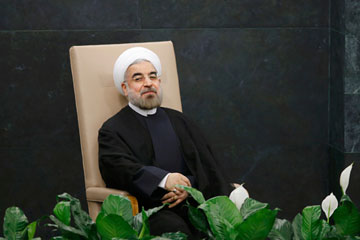
Iranian President Hassan Rouhani waits to address the U.N. General Assembly.
(2 of 4)
"I think [Iran's] system just got cold feet. Rouhani can't afford to be seen shaking hands with the devil," says Gary Samore, Obama's Iran point man until earlier this year and now president of United Against Nuclear Iran. "All this puts a damper on expectations. The two sides are very far apart in terms of substance toward getting a nuclear deal."
Old Problem, New Prose
It was the U.S. that planted the first seeds of Iran's nuclear program, as part of the Eisenhower-era Atoms for Peace project, which supplied Iran's friendly Shah with limited nuclear technology. Iran suspended its nuclear activities after the 1979 Islamic revolution but resumed them after the brutal Iran-Iraq war in the 1980s left Tehran feeling insecure.
Iran kept the scope and momentum of its nuclear program hidden through the 1990s, until in 2002 a dissident group stunned the world by exposing the program's advanced state and Iran's apparent goal of creating weapons-grade fissile material. Tehran insisted then, as it does now, that it's enriching uranium for peaceful purposes only: Supreme Leader Ayatullah Ali Khamenei has issued a fatwa, or religious ruling, against nuclear weapons, and Rouhani recently told NBC News that Iran would "never" pursue the bomb. But international inspectors and every major Western government say Tehran's nuclear program exceeds its domestic energy and research needs, and U.S. officials say they have evidence that Iran has researched how to construct a bomb. Today U.S. and Israeli officials generally estimate that Iran could build a nuclear weapon within less than a year if it chose to do so.
Obama's efforts to slow that progress continue policies begun by George W. Bush, who enraged Tehran by declaring it a member of an "axis of evil." Bush sought the first of many U.N. economic sanctions in 2006. Obama has won even tougher sanctions since Iran spurned his 2009 offer of direct talks--and he has repeatedly vowed that he's willing to use military force to stop Iran from developing a bomb. (It's not clear whether Obama's trigger would be an Iranian refusal to accept limits on its uranium enrichment or signs of actual bombmaking activity.) The vise grip of the sanctions is choking Iran. Since 2011, oil exports have dropped from 2.4 million barrels a day to less than half that rate, costing Iran's economy $70 billion. Inflation is officially pegged at more than 40% but is probably much higher. About a quarter of young Iranians are jobless--a dangerous condition at a time of revolutionary unrest in the region.
The sanctions had little effect on the posture of Ahmadinejad, who maintained a reliably defiant and obnoxious tone. But Rouhani has mounted a charm offensive that has juiced expectations in Washington and indeed the wider world. Officials in his government openly contrast themselves with Ahmadinejad's hard-line coterie, speaking of cooperation and outreach. Rouhani himself has a Westernized streak, thanks partly to a graduate degree earned in Glasgow, where he strolled in a business suit without the turban he now dons. With a gentle demeanor and fluency in English, he's adept at charming Westerners.
